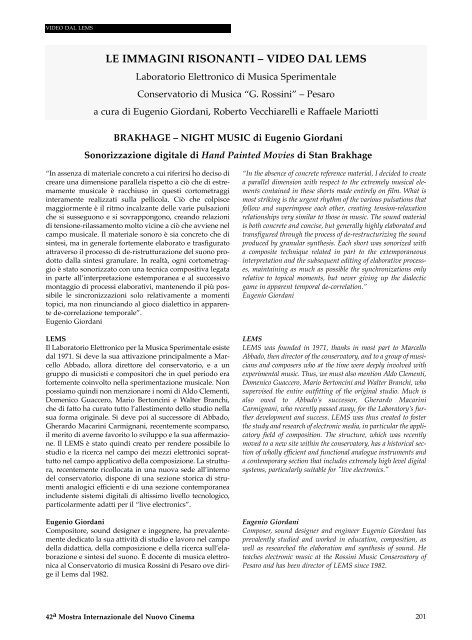Catalogo - Mostra internazionale del nuovo cinema
Catalogo - Mostra internazionale del nuovo cinema
Catalogo - Mostra internazionale del nuovo cinema
You also want an ePaper? Increase the reach of your titles
YUMPU automatically turns print PDFs into web optimized ePapers that Google loves.
VIDEO DAL LEMS<br />
LE IMMAGINI RISONANTI – VIDEO DAL LEMS<br />
Laboratorio Elettronico di Musica Sperimentale<br />
Conservatorio di Musica “G. Rossini” – Pesaro<br />
a cura di Eugenio Giordani, Roberto Vecchiarelli e Raffaele Mariotti<br />
BRAKHAGE – NIGHT MUSIC di Eugenio Giordani<br />
Sonorizzazione digitale di Hand Painted Movies di Stan Brakhage<br />
“In assenza di materiale concreto a cui riferirsi ho deciso di<br />
creare una dimensione parallela rispetto a ciò che di estremamente<br />
musicale è racchiuso in questi cortometraggi<br />
interamente realizzati sulla pellicola. Ciò che colpisce<br />
maggiormente è il ritmo incalzante <strong>del</strong>le varie pulsazioni<br />
che si susseguono e si sovrappongono, creando relazioni<br />
di tensione-rilassamento molto vicine a ciò che avviene nel<br />
campo musicale. Il materiale sonoro è sia concreto che di<br />
sintesi, ma in generale fortemente elaborato e trasfigurato<br />
attraverso il processo di de-ristrutturazione <strong>del</strong> suono prodotto<br />
dalla sintesi granulare. In realtà, ogni cortometraggio<br />
è stato sonorizzato con una tecnica compositiva legata<br />
in parte all’interpretazione estemporanea e al successivo<br />
montaggio di processi elaborativi, mantenendo il più possibile<br />
le sincronizzazioni solo relativamente a momenti<br />
topici, ma non rinunciando al gioco dialettico in apparente<br />
de-correlazione temporale”.<br />
Eugenio Giordani<br />
LEMS<br />
Il Laboratorio Elettronico per la Musica Sperimentale esiste<br />
dal 1971. Si deve la sua attivazione principalmente a Marcello<br />
Abbado, allora direttore <strong>del</strong> conservatorio, e a un<br />
gruppo di musicisti e compositori che in quel periodo era<br />
fortemente coinvolto nella sperimentazione musicale. Non<br />
possiamo quindi non menzionare i nomi di Aldo Clementi,<br />
Domenico Guaccero, Mario Bertoncini e Walter Branchi,<br />
che di fatto ha curato tutto l’allestimento <strong>del</strong>lo studio nella<br />
sua forma originale. Si deve poi al successore di Abbado,<br />
Gherardo Macarini Carmignani, recentemente scomparso,<br />
il merito di averne favorito lo sviluppo e la sua affermazione.<br />
Il LEMS è stato quindi creato per rendere possibile lo<br />
studio e la ricerca nel campo dei mezzi elettronici soprattutto<br />
nel campo applicativo <strong>del</strong>la composizione. La struttura,<br />
recentemente ricollocata in una nuova sede all’interno<br />
<strong>del</strong> conservatorio, dispone di una sezione storica di strumenti<br />
analogici efficienti e di una sezione contemporanea<br />
includente sistemi digitali di altissimo livello tecnologico,<br />
particolarmente adatti per il “live electronics”.<br />
Eugenio Giordani<br />
Compositore, sound designer e ingegnere, ha prevalentemente<br />
dedicato la sua attività di studio e lavoro nel campo<br />
<strong>del</strong>la didattica, <strong>del</strong>la composizione e <strong>del</strong>la ricerca sull’elaborazione<br />
e sintesi <strong>del</strong> suono. È docente di musica elettronica<br />
al Conservatorio di musica Rossini di Pesaro ove dirige<br />
il Lems dal 1982.<br />
“In the absence of concrete reference material, I decided to create<br />
a parallel dimension with respect to the extremely musical elements<br />
contained in these shorts made entirely on film. What is<br />
most striking is the urgent rhythm of the various pulsations that<br />
follow and superimpose each other, creating tension-relaxation<br />
relationships very similar to those in music. The sound material<br />
is both concrete and concise, but generally highly elaborated and<br />
transfigured through the process of de-restructurizing the sound<br />
produced by granular synthesis. Each short was sonorized with<br />
a composite technique related in part to the extemporaneous<br />
interpretation and the subsequent editing of elaborative processes,<br />
maintaining as much as possible the synchronizations only<br />
relative to topical moments, but never giving up the dialectic<br />
game in apparent temporal de-correlation.”<br />
Eugenio Giordani<br />
LEMS<br />
LEMS was founded in 1971, thanks in most part to Marcello<br />
Abbado, then director of the conservatory, and to a group of musicians<br />
and composers who at the time were deeply involved with<br />
experimental music. Thus, we must also mention Aldo Clementi,<br />
Domenico Guaccero, Mario Bertoncini and Walter Branchi, who<br />
supervised the entire outfitting of the original studio. Much is<br />
also owed to Abbado’s successor, Gherardo Macarini<br />
Carmignani, who recently passed away, for the Laboratory’s further<br />
development and success. LEMS was thus created to foster<br />
the study and research of electronic media, in particular the applicatory<br />
field of composition. The structure, which was recently<br />
moved to a new site within the conservatory, has a historical section<br />
of wholly efficient and functional analogue instruments and<br />
a contemporary section that includes extremely high level digital<br />
systems, particularly suitable for "live electronics."<br />
Eugenio Giordani<br />
Composer, sound designer and engineer Eugenio Giordani has<br />
prevalently studied and worked in education, composition, as<br />
well as researched the elaboration and synthesis of sound. He<br />
teaches electronic music at the Rossini Music Conservatory of<br />
Pesaro and has been director of LEMS since 1982.<br />
42 a <strong>Mostra</strong> Internazionale <strong>del</strong> Nuovo Cinema 201

















